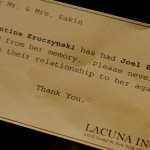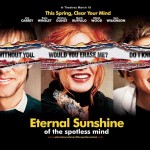Clementine: I’m Clementine. Can I… borrow a piece of your chicken?
Joel: And then you just took it… without waiting for an answer. It was so intimate; like we were already lovers.
Prejudice time once again, just so you’re clear. In this case, it’s simply that I dislike Jim Carrey. Sorry, did I said dislike? I mean I detest any movie he appears in on principle, since the interests of the movie are subsumed behind Carrey’s “hey, look at me!” showboating, as if he is doing a continuous stand-up routine. This is not an actor, it’s an attention-seeking child – though I happily accept not everyone agrees with me.
But yes, Carrey does indeed appear in Michel Gondry’s Eternal Sunshine of the Spotless Mind – and yes, I have watched it. I’ve been accused on occasions of being erratic, though this might be seen as a selfless act in the interests of my readers. Equally, the film stars Kate Winslet, Kirsten Dunst, Mark Ruffalo, Elijah Wood and Tom Wilkinson, all of whom are perfectly blameless and frequently excellent. I’m quite sure it’s not their fault they appeared opposite Carrey.
So why the change of heart? Firstly, this is a movie that people love, critics included. They lavished praise on it. I’ve included some of the plaudits at the bottom of this review so you can see for yourself. I’ve even heard sensible people say it’s at or near the top of their all-time favourites list!
Moreover, this is not Carrey in Dumb and Dumber mode; indeed, he seems at times almost grown-up, albeit required to regress to childhood on occasions. The reviews praise his intelligent performance, and that of Winslet in providing depth to a role that could easily have been reduced to “romcom kooky” in the hands of a lesser actress, all multicoloured hair but no substance.
OK, so I’ve seen it. And what do I think? I’m going to buck the trend and tell you that in spite of many fine ingredients, the soufflé falls flat. Get to grips with the initial concept of a romance told in non-linear fashion and what you have is a mad scramble across the moonscape of Carrey’s character’s mind, juxtaposed with some highly irregular shenanigans among the ludicrously incompetent and unprofessional staff of the company promising to erase minds of a person the client wishes no longer to remember.
Joel: Is there any risk of brain damage?
Howard: Well, technically speaking, the operation is brain damage, but it’s on a par with a night of heavy drinking. Nothing you’ll miss.
The conceit is fairly tidy, since it allows an erased Joel and Clementine to meet again and fall in love in spite of both having the memory of the other erased – while still having the vague feeling they already know one another. The actual plot is therefore very simple but the action consists of bizarre motifs and metaphors springing up as Joel desperately tries in vain to prevent his erstwhile girlfriend from being erased, making this akin to ten years of psychotherapy.
Doubtless this appeals to some, maybe by virtue of triggering their own romantic motifs and metaphors, but I lost interest. Paying attention to the words of the esteemed critic Roger Ebert, he says:
“Despite jumping through the deliberately disorienting hoops of its story, Eternal Sunshine has an emotional center, and that’s what makes it work.”
I don’t agree, though I know where he is coming from. In its favour, Eternal Sunshine is not superficial – it most certainly explores the complex and intertwining web of events and emotions and histories that bind two people together, and the conflicts that tear them apart, one example being her drinking habit.
Charlie Kaufman‘s script, for which he won an Academy Award, is bright and fizzing with invention, and for the more literary viewer quotes from Pope‘s Eloisa to Abelard. Look here – you’ll find plenty of quotable quotes to demonstrate Kaufman’s intelligent and eloquent wordplay.
But… the “emotional centre” of which Ebert speaks is the presupposition that in spite of the multiple erasures the couple actually do love one another and, in the final analysis, can’t bear to be apart – in spite of everything. Since Joel and Clem have virtually nothing in common, can you believe there was a deep-seated love-that-surpasses-all-understanding binding them beyond the braincells? We are asked to believe that defying logic is what love is truly about.
Clementine: You know me, I’m impulsive.
Joel: That’s what I love about you.
However, no amount of allusion, imagery and symbolism can sustain interest unless the characters are engaging, and to me they did not pass the test – nor did the madcap action keep me glued to my seat. My issue is that I did not believe in or care for the characters. All seemed unsympathetic and on occasions a little pathetic – my default emotion where Carrey is concerned. As for genre, I’m filing this review with comedies, but in practice I barely smiled, such is the conceit of film-making.
Brave venture, but ultimately not a romance in which I can believe – though on the plus side it does demonstrate that there is marginally more to Carrey than I had previously believed possible, though this will never convert me to being a fan. Sorry!
______
Eternal Sunshine of the Spotless Mind was met with overwhelming acclaim, earning a Rotten Tomatoes approval rating of 93%. Winslet’s and Carrey’s performances were generally praised. Roger Ebert commented, “Despite jumping through the deliberately disorienting hoops of its story, Eternal Sunshine has an emotional center, and that’s what makes it work.” Ebert later included the film in his “Great Movies” series. Similarly, A. O. Scott of The New York Times praised the film for being “cerebral, formally and conceptually complicated, dense with literary allusions and as unabashedly romantic as any movie you’ll ever see.”
Time Out summed up their review by saying, “the formidable Gondry/Kaufman/Carrey axis works marvel after marvel in expressing the bewildering beauty and existential horror of being trapped inside one’s own addled mind, and in allegorising the self-preserving amnesia of a broken but hopeful heart.”
In 2006, in issue 201 of Empire, Eternal Sunshine of the Spotless Mind was voted #83 in their 201 Greatest Movies of All Time poll as voted for by readers. That same year, Winslet’s performance as Clementine was included in Premiere magazine’s 100 Greatest Performances of All Time at #81. Claudia Puig, reviewer in USA Today said about her performance that “Winslet is wonderful as a free spirit whose hair color changes along with her moods. She hasn’t had such a meaty role in a while, and she plays it just right.”
Carol Vernallis points out that Gondry’s experience in directing music videos contributed to the film’s mise-en-scène and sound design. Vernallis describes some threads of the visual, aural and musical motifs throughout the film, and how some motifs can work in counterpoint.
In November 2009, Time Out New York ranked the film as the third-best of the decade:
In the past, both director Michel Gondry’s kindergarten arts-and-crafts aesthetic and Charlie Kaufman’s Möbius-striptease scripts have come off as insufferably twee and gimmicky. So why does this existential meta-rom-com always leave us teary-eyed and genuinely moved?…[T]he duo finally finds the right combination of high-concept and humanity here, taking the what-if idea of a company that lobotomizes the lovelorn into territory that’s funny, painful, poetic and unsettlingly weird.
Entertainment Weekly put it on its end-of-the-decade, “best-of” list, saying, “Only the bizarre and byzantine brain of Charlie Kaufman could turn this 2004 story about erasing all memories of love into one of the most romantic movies of the decade.”Slant Magazine placed the film at number 87 on their list of the best films of the 2000s. Paste Magazine named it one of the 50 Best Movies of the Decade (2000-2009), ranking it at number 5.[
At the end of 2009, The Onion’s A.V. Club rated Eternal Sunshine of the Spotless Mind as the number one film of the 2000s, beating out Christopher Nolan‘s Memento and the Coen Brothers‘ No Country for Old Men. The article states, “It’s the rare film that shows us who we are now and who we’re likely, for better or worse, forever to be.”
It has been calculated to be the 11th most critically acclaimed film of the first decade of the 21th century by virtue of its number of appearances on prominent ‘films of the decade’ lists. In 2013, the Writers Guild of America ranked the film at #24 on its list of “101 Greatest Screenplays”













